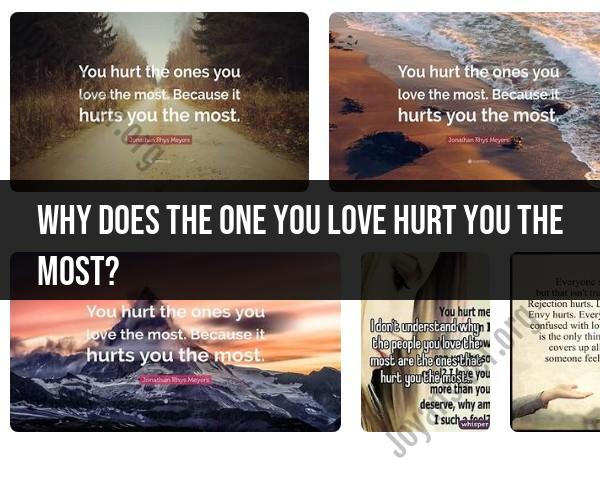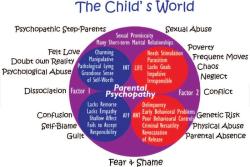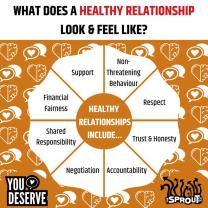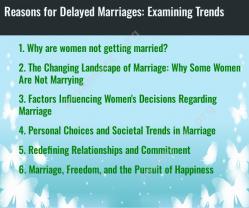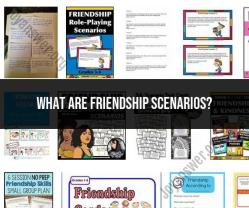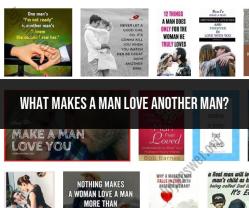Why does the one you love hurt you the most?
Love is a complex and deeply emotional experience that involves vulnerability, trust, and expectations. Sometimes, the people we love can unintentionally cause us pain, and several factors contribute to this dynamic:
1. Emotional Investment:
- Vulnerability: Love often involves opening oneself up emotionally, which can make individuals more susceptible to feeling hurt by the actions or words of their loved ones.
2. Expectations and Ideals:
- High Expectations: We often hold those we love to higher standards, expecting them to understand us, support us, and not cause us pain.
- Idealization: Idealizing a partner can lead to greater disappointment when they fall short of our expectations or behave in ways that hurt us.
3. Communication and Misunderstandings:
- Communication Gaps: Misunderstandings or lack of effective communication can lead to unintentional hurtful actions or words.
- Different Perspectives: Individuals may perceive situations differently, leading to unintentional hurt due to differing viewpoints.
4. Past Experiences and Triggers:
- Emotional Baggage: Past experiences of hurt or trauma can influence how we perceive and react to certain actions, making us more sensitive to similar situations in the present.
- Triggers: Actions or words from a loved one can unknowingly trigger painful memories or emotions.
5. Unmet Needs and Changes:
- Unmet Needs: When our emotional or relational needs aren't fulfilled, it can cause feelings of hurt and disappointment, especially when expected from a loved one.
- Changes in Dynamics: Changes in the relationship dynamics or behavior of a loved one can lead to feelings of hurt if it's perceived as a deviation from what was previously experienced.
6. Differences and Conflicts:
- Differing Values or Priorities: Clashes in values, priorities, or lifestyles between partners can lead to conflicts that cause emotional pain.
- Conflicts and Disagreements: Disagreements and arguments, even in the context of love, can lead to emotional distress.
7. Human Imperfections:
- Human Fallibility: No one is perfect. Sometimes, the actions or behaviors causing pain might stem from human imperfections, mistakes, or unintentional actions.
Understanding that love can be a complex interplay of emotions, expectations, and human imperfections might help navigate these painful dynamics. Effective communication, empathy, and mutual understanding within relationships can contribute to addressing and mitigating such sources of hurt.
- Heightened Emotions in Relationships:
Emotions often intensify in relationships, particularly with those we love, due to a combination of factors:
Emotional investment: In close relationships, we invest significant emotional energy and vulnerability, making us more susceptible to experiencing strong emotions, both positive and negative.
Intimacy and trust: Intimate relationships provide a sense of safety and trust, allowing us to express our emotions more openly and freely. This openness can lead to a more intense experience of emotions.
Interdependence: Relationships create interdependence, where our emotional state is intertwined with that of our loved ones. This interdependence can amplify emotions, as we experience the joys and sorrows of our partners more acutely.
- The Sting of Loved Ones' Words and Actions:
Words and actions from loved ones can have a profound impact, causing deep hurt due to several psychological mechanisms:
Attachment theory: Humans have an innate need for attachment and connection. When our attachment bonds are threatened or challenged, it can trigger feelings of sadness, anger, and fear.
Emotional investment: The emotional investment we make in our relationships makes us more sensitive to perceived slights or hurtful behaviors from loved ones.
Expectations: We often have expectations of how our loved ones will treat us, and when those expectations are violated, it can lead to disappointment, resentment, and hurt.
Vulnerability: In close relationships, we become vulnerable, exposing our true selves. This vulnerability makes us more susceptible to feeling deeply hurt by the words or actions of our loved ones.
- Expectations and Vulnerabilities:
Expectations and vulnerabilities play a significant role in shaping our emotional responses within relationships:
Expectations: When we enter relationships, we often have expectations about how our partners will behave, how our relationship will unfold, and how we will be treated. When these expectations are not met, it can lead to disappointment, frustration, and hurt.
Vulnerability: As relationships deepen, we become more vulnerable, opening ourselves up to emotional intimacy and connection. This vulnerability amplifies our emotional responses, making us more sensitive to both positive and negative experiences within the relationship.
Navigating the complexities of emotions in relationships requires understanding these underlying mechanisms and recognizing the impact of expectations and vulnerabilities. By fostering open communication, practicing empathy, and maintaining realistic expectations, we can cultivate healthier and more resilient relationships.
